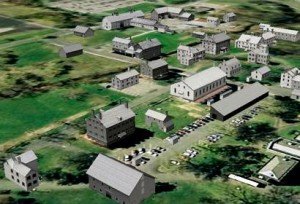The New York 3Rs Association has launched a new digital heritage web site, www.newyorkheritage.org.
NewYorkHeritage.org is a research portal for students, educators, historians, genealogists, and others who are interested in learning more about the people, places and institutions of historical New York State. The site provides immediate free access to more than 160 distinct digital collections that reflect New York State’s long history. These collections represent a broad range of historical, scholarly, and cultural materials held in libraries, museums, and archives throughout the state. Collection items include photographs, letters, diaries, directories, maps, newspapers, books, and more.
The site collections come from around the state, contributed by libraries, archives, museums and other cultural institutions, and builds on existing digital repository services administered by each of the nine reference and research library resources councils.
NewYorkHeritage.org uses OCLC’s CONTENTdm Multisite Server to bring these collections together, allowing the public to search across all items simultaneously. This project provides free, online access to images of cultural and historical significance in New York State.
A variety of materials can be found among the New York Heritage Digital Collections, including photographs, postcards, correspondence, manuscripts, oral histories, yearbooks and newspapers. Many kinds of institutions from New York State have partnered to make this project possible, including public, academic and school libraries, museums, archives and historical societies. The power of collaboration is what makes this new service possible.
Participants to New York Heritage Digital Collections are committed to enhancing the site by adding both content and contributing institutions on a regular basis. The goal of the project is to eventually connect one thousand collections and one million items from throughout New York State. All institutions interested in participating in the project are encouraged to contact the 3Rs organization that serves their region.
The New York 3Rs Association is a partnership among New York’s nine reference and research resource systems. The New York 3Rs was incorporated in 2003 to further the ability of those systems to provide statewide services. The members of the New York 3Rs Association are: the Capital District Library Council, Central New York Library Resources Council, Long Island Library Resources Council, Metropolitan New York Library Council, Northern New York Library Network, Rochester Regional Library Council, Southeastern New York Library Resources Council, South Central Regional Library Council, and Western New York Library Resources Council.
 Shaker Heritage Society recently completed a dynamic on-line resource called Virtual Watervliet (VWV). Virtual Watervliet provides a high quality experience via a website or mobile application that helps users better understand the significance and development of America’s first Shaker settlement.
Shaker Heritage Society recently completed a dynamic on-line resource called Virtual Watervliet (VWV). Virtual Watervliet provides a high quality experience via a website or mobile application that helps users better understand the significance and development of America’s first Shaker settlement.




